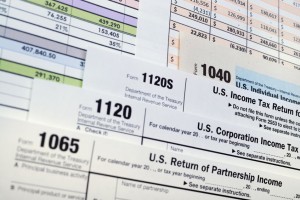Rules Are for Schmucks: Challenge to the Incredible Tax Scam—the Parsonage Exemption—Fails
 Photo by lobzik / 123RF
Photo by lobzik / 123RF If a tree falls in a forest and no animal is around to hear it, does it make a sound?
If a constitution has a rule against government establishment of religion but no one is allowed to enforce it, is it really a rule?
Deep questions. What’s not a deep question is how absurdly unfair is the parsonage exemption that remains the law of the land, thanks to this month’s refusal of the Seventh Circuit Court of Appeals to allow American citizens even to attempt to challenge it.
The parsonage exemption is grotesquely simple. Suppose your employer comes to you with a simple proposition: to cut your salary by $X per year, and instead pay you that same $X in the form of a housing allowance, exactly matching your monthly rent and utilities payment. There’s nothing the least bit wrong with such an arrangement, and IRS couldn’t care less. They’re just going to tax you on the total amount you receive from your employer, regardless of how the employer labels it—unless, of course, you are a “minister of the gospel,” to quote the statute, in which case you receive the $X completely tax-free. This can save you many thousands of dollars a year—the richer the housing allowance, the bigger the savings.
Although this is a tax expenditure rather a direct subsidy, the economics are exactly the same. The government is taking more money out of your pocket and mine, and less out of the pockets of “ministers of the gospel,” because it likes them better than it likes you and me.
Last summer CNN posted a story called, “The Lavish Homes of American Archbishops.” We can’t reproduce the pictures of the lavish homes here because they’re copyrighted, but you should check them out. New York’s Cardinal Timothy Dolan, for example, lives with three other priests in a magnificent mansion on Madison Avenue that an appraiser hired by CNN estimated was worth some $30 million. That’s just for the building and land—the estimate doesn’t include all the precious antiques and other furnishing inside. So what’s the annual rental value of a $30 million house? Probably at least a million dollars a year, maybe double that. All of which is provided to Dolan and friends tax-free.
Chicago’s new Archbishop Blasé Cupich just moved into an estate overlooking Lincoln Park. The appraisers estimate that this place is only worth about half of Dolan’s pad “as is” but could fetch a lot more from the right buyer. Cupich and his three roomies pay no tax at all on their luxurious free housing, nor do the nuns in an adjoining coach house who care for him and his mansion.
That must be because these people are better than you and me; otherwise, why would Congress give them such an extraordinary break? But leave aside bad people like you and me for a moment. Firefighters, nurses, police officers and teachers all do critically important work in their communities, generally for meager pay, and none of them gets this kind of housing allowance break. Why are ministers of the gospel treated better than they are?
What about the ministers who have grown so rich selling salvation that they are provided with multiple homes? The U.S. Tax Court addressed this a couple of years ago in a case involving a high-paid church musician who had previously served jail time for tax evasion. No problem, said the court—ministers are entitled to take as many tax-free housing allowances for different homes as the suckers in their congregations are willing to give them.
The Freedom From Religion Foundation filed a suit a few years ago, claiming that their leaders should be able to get tax-free housing allowances just like “ministers of the gospel” can. And they won, at the district court level, because the parsonage exemption is so laughably indefensible. The Court of Appeals, though, has just decided that the plaintiffs didn’t do enough advance paperwork, so it won’t hear the case. It’s not enough, said the learned judges, that they carefully designated a portion of their regular salary as a housing allowance, just like the ministers do. The court said they also needed to have gone through the meaningless exercise of first applying for the parsonage exemption and then being rejected for it—a foregone conclusion because they are not, and do not claim to be, ministers of any gospel.
So now maybe these plaintiffs, or someone else, will do what the Court of Appeals requires and act out the farce of applying for an exemption—in the certainty that they won’t get it. Then they can spend more years and more dollars working their way through the legal system to get back to the Court of Appeals, so it can do its job and rule that giving ministers of the gospel a tax break just because Congress wants to suck up to religion violates our Constitution. Meanwhile, how many more millions will have poured into God experts’ pockets before justice is done?
